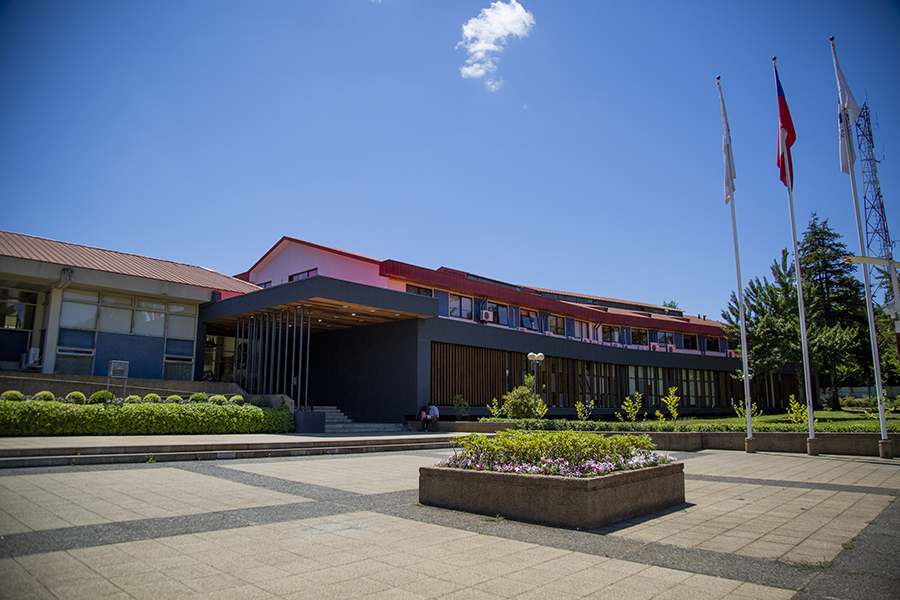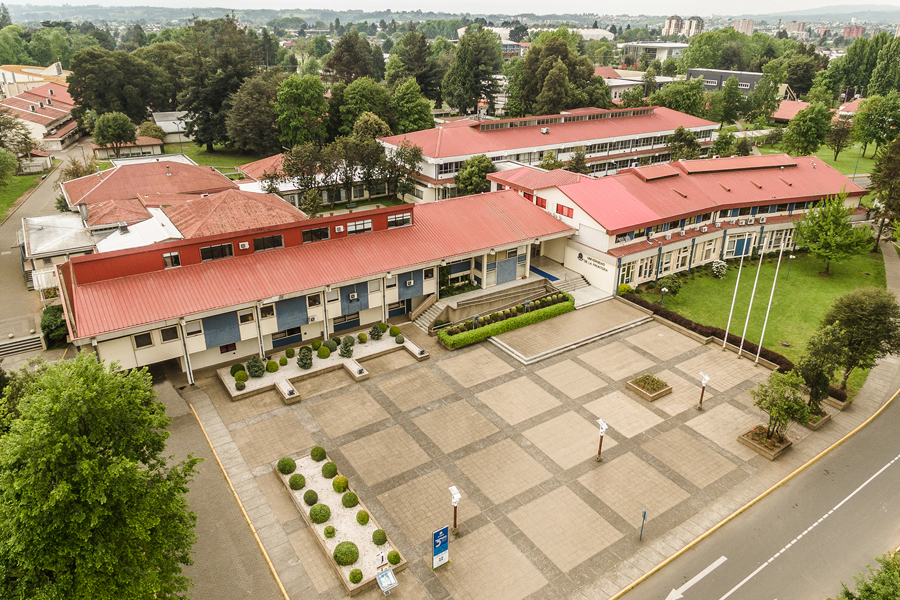|
The University teacher Gladys Morales Illanes, of the UFRO Department of Public Health, shares information on a healthy diet to cope with quarantine because of COVID-19. |
Since the first case of COVID-19 in our country on March 3, many of the routines we were used to have been disrupted. As we have to stay at home, one of the most affected aspects is our diet, leading us to unhealthy habits. The recommendation for the entire population is to eat healthy, including people affected by COVID-19 with moderate and/or no symptoms. Therefore, it is important to understand what a healthy diet consists of, in order to put it into practice. For Gladys Morales Illanes, a dietician with a Master's degree in Nutrition and Food with specialization in the Promotion of Health and the Prevention of Nutrition-related Diseases, a healthy diet preferably consists of natural foods, such as fruits and vegetables, legumes, whole grains, nuts, avocado, olive or canola oil and, in a smaller amount, those of animal origin such as meat, fish, eggs and dairy products. A healthy diet also limits the amount of calories, sugar, saturated fat and salt. Therefore, it is important to review the nutritional information on packaged food, in order to compare and choose those products that contain less of these critical elements. DIET AND IMMUNE SYSTEM A balanced and healthy diet, as well as the regular consumption of probiotics, contributes to the proper functioning of the body's defenses. Fundamental nutrients are: vitamin A, vitamins of the B complex (B12, B6, folates), vitamin C, vitamin D and vitamin E, which contribute to the normal functioning of the immune system. Therefore, the adequate intake of these nutrients must be ensured. “Some studies have shown that several COVID-19 patients suffered from an alteration of the intestinal flora (microbial dysbiosis). It is possible that the consumption of prebiotics or probiotics could prevent further infections. Therefore, a balanced diet rich in fruits, vegetables, whole grain products, legumes, nuts, seeds and sugar-free dairy products can help to maintain a healthy intestinal flora and to strengthen the immune system,” Gladys Morales explained. The university teacher at the Department of Public Health of the Universidad de La Frontera (UFRO) emphasized that “in this time of quarantine, a healthy diet is essential, because it will provide all the nutrients required to maintain the normal functioning of the immune system, to prevent an excess of weight and to control anxiety. For this reason, you should also schedule your meals: plan the menu for each day of the week, try to cook as a family and start trying different dishes that may encourage the whole family to get used to a healthier, more natural and more home-made diet”. SHOULD CERTAIN FOODS BE AVOIDED DURING QUARANTINE? Those foods with a high caloric intake, saturated fats, sugar and/or salt are not recommended for a healthy diet and neither during quarantine, since they may increase the risk of overweight or obesity and other related diseases. As a general rule, the following foods should be avoided: precooked foods (croquettes, pizza, lasagna, cannelloni, etc.); fast food (French fries, hamburgers, sausages, etc.); sugar, sweets and cakes, sweetened drinks and juices, and alcoholic drinks (including wine or beer). SENIOR CITIZENS AND DIABETICS The dietician Gladys Morales pointed out that senior citizens are a risk group in terms of hydration; the feeling of thirst is decreased and many times they do not want to drink water. Therefore, we recommend the use of sugar-free neutral or flavored jelly, which can be very helpful when it comes to drinking the recommended amount of water, especially when the patient has a fever. In the weekly menu you should also consider to include some preparations that the elderly like, such as soups made with vegetables, (fat free) meat and fish, as well as herbal infusions and tea. In case of throat discomfort, fever or appetite loss, the expert recommends to prepare dishes that can be easily swallowed in order to facilitate the ingestion of fruits and vegetables. Mashed vegetables or a cream enriched with olive oil, as well as peeled and diced fruits, can help to increase the appetite for fruit. For diabetics, it is essential to maintain the diet provided by their nutritionists. Now more than ever they have to maintain a normal glycaemia in order to avoid complications that might force them to go to the emergency room. RECOMMENDATIONS DURING QUARANTINE With the aim of helping the university community to maintain an adequate diet in times of quarantine, the UFRO dietician makes the following recommendations: -Stay hydrated. Drink at least 2 liters of water per day. You can also drink herbal teas or water with lemon or orange slices, without adding sugar.
Written by: UFRO Communications Office
|
|
The UFRO Laboratory of Bioanalysis and Molecular Diagnosis and the Laboratory of Molecular Morphology and Cell Culture have been authorized by the Chilean Ministry of Health to support the regional health services in the diagnosis of COVID-19. |
The Araucanía region and especially the city of Temuco are among the territories in Chile with the highest incidence of COVID-19 cases at the moment. It is a pandemic that has not yet reached its peak in Chile and which is challenging even the most powerful countries in the world. The timely diagnosis seems to be a determining factor in the fight against this pandemic. In this context, the Universidad de La Frontera (UFRO) has made its scientific capabilities available through two laboratories that were authorized by the Ministry of Health (MINSAL) on Wednesday, April 1, to join the national network of diagnostic test facilities that consists of 13 locations at the moment. This initiative is coordinated by the Ministry of Health and Dr. Olga Barbosa, the Regional Secretary of the Ministry of Science of the Southern Macro-zone in Chile. “Our laboratories have the highest quality standards. Making them available to the region and the country to face this health crisis is part of our commitment with the region; it is our responsibility as a state and public university,” said the Rector of the Universidad de La Frontera, Dr. Eduardo Hebel Weiss. The Vice-rector for Research and Graduate Studies at UFRO, Dr. Renato Hunter Alarcón, explained that the laboratories will be operative this week to begin analyzing the tests that arrive from the Hernán Henríquez Aravena Hospital (HHHA) and the centers associated with the Southern Araucanía Health Service (SSAS). Therefore, they will work in direct coordination with the needs of the health centers. “At the moment we are refining the test protocols and validating the methodologies. We are pleased to make our scientific, infrastructure and human resource capacities available to the region, to contribute to the well-being of everyone during one of the most critical moments worldwide,” he added. The Laboratory of Bioanalysis and Molecular Diagnosis and the Laboratory of Molecular Morphology and Cell Culture have the technical equipment to contribute to the analyses, but they also have the experience and expertise of their researchers, since they belong to the centers of excellence of the Faculty of Medicine of UFRO, which bring scientists in different fields together. The first laboratory belongs to the Center of Excellence in Translational Medicine and the second one to the Center of Excellence in Morphological and Surgical Studies. It should be noted that the diagnosis of COVID-19 is performed using the real time RT-qPCR technique. According to Dr. Álvaro Cerda, head of the Laboratory of Bioanalysis and Molecular Diagnosis, “this is an RNA virus and in order to diagnose it, it is necessary to convert that RNA into DNA. This is done through a process of reverse transcription (RT) which detects the amplification of genetic material in real time”. But the researcher mainly emphasizes the collaboration and communication between scientists who are currently working on one of the world' s biggest challenges. “We have put our soul into this. This is not about producing a paper, we will still have time for that, today is about saving lives. Many researchers, professors, professionals and doctoral students have put themselves at the service of this cause,” Dr. Cerda pointed out. For the same reason, Dr. Mariela Muñoz, who is in charge of the UFRO Laboratory of Molecular Morphology and Cell Culture, believes that “in this contingency it is a duty for state universities to put themselves at the service of regional needs”. With regard to the laboratory she coordinates, equipment calibration processes are being carried out and the necessary protection measures are being adapted in order to be able to work with these samples.
Written by: Karimme Riadi Millas |
|
|
Dear University Community, We would like to inform you that we maintain the preventive suspension of all academic and administrative activities in accordance with the total quarantine ordered by the authorities of the municipalities Temuco and Padre Las Casas. This measure is equally effective for our Campuses in Angol and Pucón. Kind regards, Temuco, Chile, March 31, 2020 |
|
Infrastructure at the service of the hospital, the manufacturing of face shields with 3D printers, the support with equipment and professionals regarding the detection of COVID-19 and the tracking of cases, the contribution of knowledge for decision-making processes, and an important support of student volunteers in clinical care, are part of the actions of UFRO to face a pandemic, where stopping its spread depends on everyone. |
Given the emergency that the country is experiencing with regard to the spread of COVID-19 (Coronavirus), and since the first case in Chile was reported on March 3, the Universidad de La Frontera (UFRO) has taken on the responsibility of carrying out a number of actions to support the work being done by the various health services in the Araucanía Region. And it is also part of UFRO's social and community commitment to face this crisis scenario, as stated by the rector Dr. Eduardo Hebel Weiss, who stressed the university's willingness to support the health authorities in those areas where its capabilities as a higher education institution and its role as a public and state university are relevant. In this context, he explained that one of the actions carried out by UFRO was to provide support in terms of infrastructure in the event that the capacity of the hospital network in the region was exceeded. Rector Hebel explained that this offer was made to Richard Caifal, the deputy governor of the Araucanía region, and that it involved the provision of space that can be used as hospitalization units. “In case of an eventual need for patient hospitalization facilities, we want the regional authorities and the community to know that they can rely on our university. We do have the infrastructure and facilities that would allow such a solution, for example in some of the classrooms, and we are even analyzing the technical possibilities of the rooms located in the Aula Magna.” The Minister of Health, Jaime Mañalich, during his recent visit in the Araucanía region, also appreciated this commitment and contribution. In the context of the assessment of this contingency in the region, he highlighted that they have been working together with several universities, “but in particular with the Universidad de La Frontera to provide human and technological equipment for a better management of this crisis”. DETECTION OF COVID-19 BY CRP In an initiative coordinated by the Chilean Ministry of Science, Technology, Knowledge and Innovation and the Ministry of Health, the Universidad de La Frontera was asked to provide equipment to perform diagnostic tests for COVID-19 in the Araucanía region. Currently, these laboratories are in an accreditation process and are expected to be accredited by the ISP within the next few days. In addition, the supplies to perform these tests, the security implements and the methodological training instructions are expected to arrive, in order to start working on the diagnostic tests. 3D PRINTED FACE SHIELDS The Universidad de Talca, Universidad de Concepción, Universidad de La Frontera, Universidad de Los Lagos and Universidad Austral de Chile have joined forces to manufacture these products that will be used in the public health system. In the case of UFRO, the professionals in charge are research assistants and engineers of the Composite Materials Laboratory of the Department of Mechanical Engineering, who are manufacturing visors or face shields by using 3D technology. The materials have been donated by different suppliers, who have provided the required plastic material. On March 31, a donation of 40 face shields was delivered to the Dr. Hernán Henríquez Aravena Hospital in Temuco, and the university will continue the manufacturing process in order to provide them in the most critical stages. They will also be delivered to the Regional Health Service so that this entity can use them according to their requirements. “As a public university it is essential that we provide support at times of emergency. This is not only a commitment for us, we also have the duty to connect with the community and to provide different services with the help of our employees and students,” said the Vice-rector for Research and Graduate Studies, Renato Hunter. STUDENT VOLUNTEERS IN CLINICAL CARE Meanwhile, the Faculty of Medicine of the Universidad de La Frontera has already submitted the first list of volunteer medical students who are now in their sixth and seventh year of their studies to the Ministry of Health and the Superintendence of Health. And also the other study programs of the Faculty are developing lists of volunteers from the programs in Physiotherapy, Nutrition and Dietetics, Medical Technology, Chemistry and Pharmacy, Nursing and Occupational Therapy. SUPPORT IN TRACKING COVID-19 CASES AND DECISION-MAKING The Universidad de La Frontera and the Regional Health Department have established the necessary contacts in order to work together on this health crisis. The Regional Health Department is interested in working with professionals of the university in order to help with the tracking of COVID-19 case, as well as with the analysis of data for decision-making. The team of professionals and academics of the UFRO Department of Public Health and the Center of Excellence CIGES will coordinate the different actions of support, which will also include the participation of graduate students and eventually undergraduate students of some of the programs in the field of health, who are in their senior years. In addition, the team of the UFRO Department of Public Health has the support of the infectious disease expert Carla Concha, of the Regional Health Service, as well as of Jaime Neira, an academic staff member of UFRO.
Written by: UFRO Communications Office
|
|
Frustration, anger, fear, paranoia and other feelings are often present in those who must comply with mandatory self-isolation in response to Covid-19 and in order to prevent the spread of coronavirus. Dr. Marianela Denegri Coria, an academic staff member at UFRO, talks about scopes and recommendations to overcome these feelings. |
Social distancing is one of the measures that have been implemented in most countries since the COVID-19 outbreak. This leads people to face moments of uncertainty that can affect their mental health, generating anxiety and even panic-like symptoms. Any change in a person's routine can be stressful, although the level of stress will vary according to age, personality and work habits. For example, people who regularly perform repetitive or routine activities will find it more difficult to adapt to a different and unstructured situation, while those who have a frequently changing or rather solitary job, as in the case of most researchers, will have less problems in adapting to a different and unstructured situation or to remote work. For Dr. Marianela Denegri, who has a PhD in psychology and is the director of the Scientific and Technological Nucleus for Social Science and Humanities (Núcleo Científico Tecnológico en Ciencias Sociales y Humanidades) at the Universidad de La Frontera (UFRO), the most complex issue is social distancing. The level of difficulty will depend directly on each one’s circumstances, whether the person lives with his or her family or alone and if he or she has other networks on the outside. It will also depend on the person's age. Self-isolation is not the same for a senior citizen, who requires social support and experiences this situation as a great threat, as for a younger person, who is able to remain remotely connected to his or her social ties due to technological literacy. This implies that, depending on a person's characteristics, the required level and type of support will be different. However, the most significant measure against coronavirus is self-isolation. HOW DO WE EXPLAIN THE SITUATION TO OUR CHILDREN? In the case of our children, the most complex thing is to explain to them what is happening and how we can handle the situation, without scaring them, since they cannot handle this kind of fear. The most important thing is that the parents inform themselves first, with reliable and scientifically founded data, before giving explanations to their children. This way they can avoid scaring them, transmitting myths or other contents that would make the adaptation of a child to the new situation even more complex. “It is important to start with the children's own knowledge and to ask them what they think is happening. If they don't know, first explain, in simple words, what viruses are, and then describe how this particular virus is transmitted from person to person, and that we have to take care of ourselves and our family by staying at home and being careful about our hygiene. It can be fun to teach them, for example, how to wash their hands with a song,” the specialist said. “It is also important not to hide the situation from them. Children have the right to be informed,” she added. “It is important to give them opportunities to express their fears and emotions, for example, through drawing and then talking about it. On the Internet and in social networks there are also audiovisual resources that can help us to better communicate these issues to them.” WHAT WILL HAPPEN AFTER LOCKDOWN? It will not be easy to return to normal life, especially since we do not know how long the period of social distancing will last. In addition, given the emotional burden and possible life-threatening episodes such as being infected or having close family members who are sick or even in extreme situations, it is likely that some people may require the assistance of specialists in order to return to their daily lives. Dr. Marianela Denegri explains that “we must be prepared”, because depending on the intensity of the experiences people undergo during this situation and its extension, some people may suffer episodes of anguish, depression and even post-traumatic stress. Therefore, “the work environment should consider a strategy of reintegration depending on the individual's situation. When people are aware of this support, it may help them to handle the return to their normal lives better. Even those who do not suffer from traumatic events during this period will also need a time to readjust and progressively return to work.” The important thing is that we must be aware that this crisis will pass and that we must take care of ourselves during it and also prepare for when everything returns to normal, because many aspects of the world are likely to change as well. HOW TO COPE WITH SOCIAL DISTANCING In order to cope with social distancing during the COVID-19 pandemic, the UFRO researcher invites everybody to put the following recommendations into practice: 1. Just accept that we are facing a crisis that affects all of us, and that we must take care of ourselves in order to care for others.
Written by: UFRO Communications Office
|










